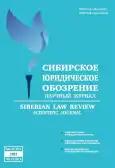Комплексирование как тенденция развития института специальных знаний в уголовном процессе с участием несовершеннолетних
- Авторы: Медведева А.С.1
-
Учреждения:
- Северо-Западный региональный центр судебной экспертизы Министерства юстиции Российской Федерации
- Выпуск: Том 19, № 2 (2022)
- Страницы: 165-175
- Раздел: УГОЛОВНЫЙ ПРОЦЕСС (архивный раздел)
- Статья опубликована: 09.09.2022
- URL: https://bakhtiniada.ru/2658-7602/article/view/349693
- DOI: https://doi.org/10.19073/2658-7602-2022-19-2-165-175
- EDN: https://elibrary.ru/FSIISC
- ID: 349693
Цитировать
Полный текст
Аннотация
В статье рассматривается комплексирование как значимая тенденция в генезисе института специальных знаний в уголовном процессе с участием несовершеннолетних. Изучаемое явление определено как совмещение одним лицом двух или более процессуальных функций и/или специальных знаний для обеспечения многосторонней оценки важных для уголовного дела обстоятельств и индивидуальных особенностей несовершеннолетнего. Выделены и представлены четыре исторических этапа формирования отечественного института специальных знаний в уголовном судопроизводстве с участием несовершеннолетних. Сделан вывод, что указанный институт прошел путь развития от ситуативного привлечения немногочисленных сведущих лиц через применение специальных знаний самими правоприменителями с факультативным привлечением сведущих лиц до сформировавшейся практики производства комплексных экспертиз (в которых комиссионность - не обязательное свойство) и активного привлечения разных сведущих лиц, в частности, педагога и психолога. Рассмотрены актуальные ситуации, в которых несовершеннолетие участников уголовного процесса наряду с их индивидуальными особенностями (психофизиологическими, культурными, религиозными, языковыми и другими) влечет необходимость комплексирования процессуальных функций и/или специальных знаний. Представлены результаты эмпирического исследования, проведенного автором статьи под руководством кандидата юридических наук, доцента Е. В. Елагиной (анкетирование 161 следователя и 116 прокуроров по вопросам привлечения сведущих лиц в досудебном производстве по уголовным делам с участием несовершеннолетних); показано, что в большинстве случаев респонденты отмечают ведущую роль психолога при производстве следственных действий с детьми и подростками. Отмечено, что функции, традиционно реализуемые педагогом, не отвечают целям его привлечения к уголовному процессу, в связи с чем необходимо исключить возможность такого привлечения. Сделан общий вывод, что при комплексировании первое место должно отводиться специальным психологическим знаниям, поскольку именно психологи компетентны в оценке ряда значимых для уголовного судопроизводства явлений (например, эмоциональных и поведенческих реакций несовершеннолетних лиц). Автором предложен способ оптимального комплексирования процессуальных функций и/или специальных знаний в уголовном процессе с участием несовершеннолетних - применение специальных знаний правоприменителем или совмещение одним сведущим лицом двух и более функций. Показано, что предложенный способ позволит сократить количество контактирующих с несовершеннолетним лиц и снизить психологическую нагрузку на него.
Об авторах
Анна Сергеевна Медведева
Северо-Западный региональный центр судебной экспертизы Министерства юстиции Российской Федерации
Автор, ответственный за переписку.
Email: 98765_89@mail.ru
ORCID iD: 0000-0002-0921-588X
SPIN-код: 8053-6926
старший государственный судебный эксперт
Россия, ул. Некрасова, 8–10, Санкт-Петербург, 191014Список литературы
- Майлис Н. П., Орлова В. Ф. Еще раз о комплексной экспертизе и путях ее развития // Теория и практика судебной экспертизы. 2014. № 1 (33). С. 138-147.
- Balogh K., Salaets H. Children and Justice: Overcoming Language Barriers. Cooperation in Interpretermediated Questioning of Minors. Cambridge ; Antwerp ; Portland : Intersentia, 2015. 424 p. URL: https://www.arts.kuleuven.be/tolkwetenschap/projecten/co_minor_in_quest/children-and-justice-1 (дата обращения: 20.04.2022).
- Светличный А. А. Зарождение и развитие института специальных знаний в уголовном судопроизводстве в дореволюционной России // Актуальные проблемы российского права. 2015. № 2 (51). С. 137-144.
- Сулейманова С. Т. Ювенальная юстиция в эпоху постмодернизма // Известия высших учебных заведений. Поволжский регион. Общественные науки. 2007. № 4. С. 114-120.
- Mallett C. A. Disparate Juvenile Court Outcomes for Disabled Delinquent Youth: A Social Work Call to Action // Child & Adolescent Social Work Journal. 2009. Vol. 26, iss. 3. Р. 197-207. https://doi.org/10.1007/s10560-009-0168-y
- Смирнова С. А., Секераж Т. Н., Кузнецов В. О. Междисциплинарные исследования в судебно-экспертных учреждениях Минюста России: актуальные направления лингвистической и психологической экспертизы // Теория и практика судебной экспертизы. 2017. Т. 12, № 4. С. 6-11. https://doi.org/10.30764/1819-2785-2017-12-4-106-109
- Елагина Е. В. Участие педагога в допросе несовершеннолетнего свидетеля или потерпевшего (ст.ст. 191, 280 УПК РФ), подозреваемого или обвиняемого (ч. 3 ст. 425 УПК РФ) // Актуальные вопросы прокурорской деятельности / Н. А. Васильчикова [и др.] ; под ред. Г. В. Штадлера. СПб. : С.-Петерб. юрид. ин-т (филиал) Ун-та прокуратуры Рос. Федерации. 2018. Вып. 7. С. 159-169.
- Машинская Н. В. Проблемы обеспечения эффективного участия педагога и психолога в досудебном производстве по уголовным делам несовершеннолетних // Вестник Северного (Арктического) федерального университета. Сер.: Гуманитарные и социальные науки. 2015. № 2. С. 123-130.
Дополнительные файлы












































